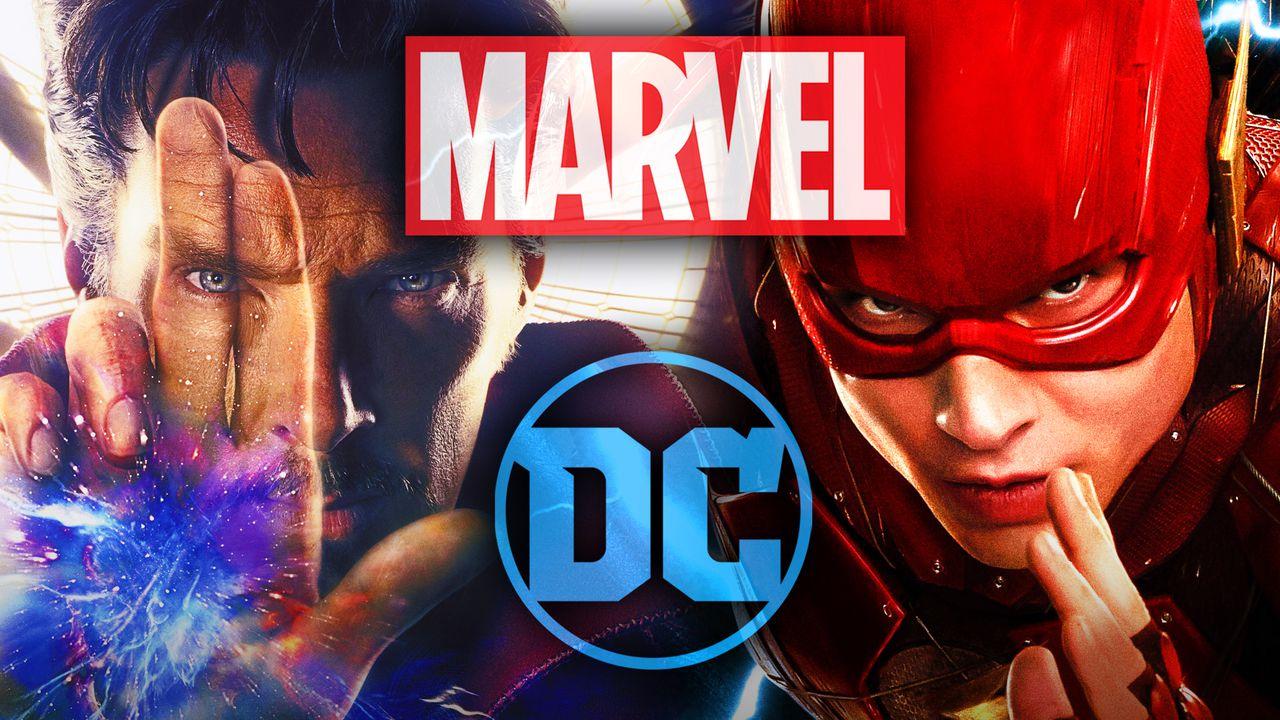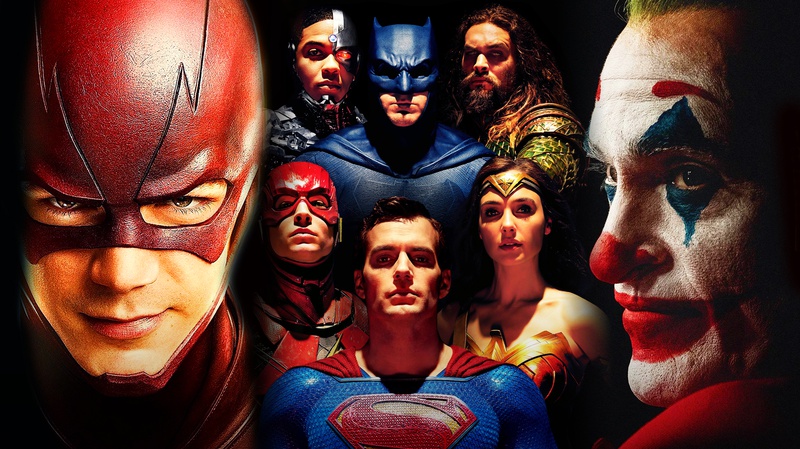
Both Marvel Studios at Disney and DC Films at Warner Bros. are heading into new eras in the '2020s. After capping off their wildly successful Infinity Saga last year, Marvel is ramping up their film slate with soon-to-be four movies on the big screen per year, and the franchise is set to make its Disney+ debut with several upcoming series. Plus, Marvel now has characters like the X-Men and Fantastic Four in their sandbox since Disney acquired Fox.
DC’s road since the end of Christopher Nolan’s The Dark Knight Trilogy and the subsequent start of the DC Extended Universe has been much rockier, but most of their recent films have done pretty well critically-speaking - with some also spectacularly surpassing expectations at the box office - and DC FanDome has gotten fans hyped for what the franchise has on the horizon.
Marvel’s Multiverse

From the very beginning, the Marvel Cinematic Universe has taken the slow-burn approach to things. The first four years of its existence consisted entirely of stand-alone movies designed to introduce us to its core superheroes, the one exception being a sequel to one of those films. All of those heroes then were brought together in The Avengers , and for the next few years, more heroes were slowly added into the mix and more crossover cameos appearances were sprinkled into the movies. This then became the norm in Phase 3 and culminated in two movies featuring nearly every superhero to appear in the franchise.
Patience and a willingness to play the long game have been the biggest virtues of Marvel Studios. Introducing things slowly helped build hype and gave audiences time to digest and understand the storylines and characters being presented by the franchise, and this paid off in a massive way for them. And while the studio is preparing to release more content annually than ever before, it’s seeming like their approach to new concepts is going to resemble their original model of gradually incorporating ideas into the franchise.
We know the multiverse is going to play a big role in the MCU in the near future, given the title of 2022’s Doctor Strange in the Multiverse of Madness . The Disney+ series WandaVision will serve as a lead-in to the movie, so there’s a good chance the idea of the multiverse will come up at some point during that series. But, Marvel has planned far enough ahead that MCU fans without access to Disney+ won’t be totally out of the loop when Multiverse of Madness rolls around; there's a good chance the multiverse will play a role in Tom Holland's upcoming Spider-Man 3 movie considering both Doctor Strange and Jamie Foxx's version of Electro from Sony's The Amazing Spider-Man 2 will appear in the film.
What's more, the MCU has actually already played around with alternate universes; the Time Heist in Avengers: Endgame resulted in the creation of several alternate universes that branched off of the main MCU (including one where Loki gets away with the Tesseract in 2012, which will lead into his own Disney+ series), and the movie took time to explain how the branched timelines were formed and the “rules” of that kind of time travel.
Even if those branched timelines aren’t the kind of alternate universes explored in the Doctor Strange sequel, Endgame introduced the idea of their existence into the MCU in a way that general audiences could understand. And it isn’t the only movie in which the seeds of the multiverse or similar concepts were planted; the Quantum Realm in both Ant-Man movies is implied to have some sort of dimension-bending abilities, though neither film goes very deep into it. And while Mysterio’s backstory as coming from an alternate universe in Spider-Man: Far From Home turns out to be a lie, we as the audience are led to believe we are watching a hero from another dimension who has traveled to help ours for a decent portion of the movie’s runtime.
Marvel has already explored time travel and revealed the existence of alternate dimensions, so opening up the multiverse for adventures in Phase 4 and beyond just seems like the next natural step for the franchise to go in. Many feared that Endgame was the ceiling when it came to interconnected storytelling in the MCU, and that we would only be seeing smaller crossovers from here on out. However, introducing a multiverse will allow those more intimate stories to continue and go in new directions and the scope of the franchise to grow even bigger when the time comes.
But, some still wonder if the current superhero craze in popular culture has reached its peak. Big team-ups and crossovers are no longer a novelty, and some of the heroes are on their umpteenth iteration onscreen. Both DC and Marvel seem to recognize this, and are preparing to open the door to a concept well-understood in comics but still relatively “out there” to general audiences: the multiverse. However, each company is incorporating it in a very different manner, and how successful their methods are is sure to define this era of onscreen superheroes.
DC’s Alternate Earths

For much of the past decade, DC has tried to “catch up” with Marvel’s model of an established cinematic universe with frequent crossovers between properties. However, they sort of did it backwards from the way Marvel went about it. Marvel Studios didn’t do a full-on crossover movie until their sixth feature, The Avengers , and had made sure to feature all six of its leads in at least one previous movie. But, the second movie in the DC Extended Universe was Batman v Superman: Dawn of Justice , which not only starred Batman, Superman, and Wonder Woman, but it also served as an introduction for two of those heroes since only Superman had been given his own movie prior.
Thus began the DCEU’s process of introducing characters in team-up films and giving them their own movies later on, as seen with Wonder Woman after Batman v Superman , Aquaman after Justice League , and Birds of Prey after Suicide Squad (the latter pair referring to Harley Quinn’s DCEU trajectory so far). DC’s mentality has been to go big right off the bat so audiences will be interested in the smaller stuff later, the opposite of Marvel’s strategy of building up to large-scale events. But, while Marvel’s crossovers have been big hits for the studio, DC’s biggest successes have come when they focused on standalone projects that weren't primarily focused on tying into a greater narrative. So, it makes sense that despite the very nature of a multiverse being to connect as many things together as possible, DC’s immediate plans for its multiverse are focused on the ability to create as many different projects as possible.
People have wondered how projects like Joker , The Batman , and the CW’s Arrowverse connect to the main DCEU, and now, DC has an explanation that frees them from having to answer continuity questions and tie everything into a master plan. This also allows DC to create crossovers between any of their properties, from cameos like the meeting between Grant Gustin and Ezra Miller’s versions of Barry Allen/The Flash, to the inclusion of multiple iterations of Batman in the upcoming The Flash movie. And, there can be as many or as few projects set in the same universe as desired, such as the movie and streaming show duo of The Batman and its Gotham PD prequel series and projects serving as the sole content from their own universe, like Joker .
Inter-Dimensional Challenges
While the different approaches to the multiverse seem well-suited to the strengths of their respective studios, both have the potential to be troublesome. Marvel has developed proven methods of organically getting its audiences up to speed on the way things work in the MCU, but adding the complications of a multiverse into the mix could prove to be too difficult for audiences to keep up with. There’s also the issue of having Disney+ content be “required” viewing prior to certain movies to some degree, such as WandaVision being a lead-in to Doctor Strange in the Multiverse of Madness . Since Disney+ won’t be available in all markets the theatrical films will, Marvel Studios will need to find a way to make sure movie-only viewers will understand everything they need to in order to enjoy the content the way they normally would. The close tie-ins could also result in a domino effect of collapse; if one show or movie doesn't go over well and has elements closely tied to others, those projects could also be problematic for the studio.
There’s also the issue of the film rights to certain Marvel characters being owned by Sony and that company trying to tie the movies they make into the MCU, such as by including Michael Keaton’s Vulture first seen in Spider-Man: Homecoming in the upcoming Morbius . Whether they like it or not, Marvel Studios may have their hands tied in having to include the Sony movies in the MCU canon, and the multiverse has the potential to either help the situation or make things even more confusing, depending on what happens with the multi-studio characters in Sony films.
DC’s main challenge when it comes to managing it’s multiverse will be similar to the ones it has had with managing a single universe; that is, making sure everything makes sense and doesn’t devolve into an incoherent mess. Not feeling compelled to tie everything together will surely be freeing for DC when creating standalone projects, and for the most part, seems like it will allow each of them to exist as its own thing, so failure won't necessarily bring subsequent projects down with it. However, given that DC has struggled with team-up movies in the past, it may be a challenge for them to incorporate the multiverse as a central element to their stories if they choose to go that route. There is definitely concern that if it took this long for DC to get its main movie universe together, how will they be able to handle several of them?
While Marvel is using the advent of a multiverse to expand upon the connected style of storytelling for which it has become so beloved for, DC’s main motivation behind introducing a multiverse is to get away from the obligation to connect everything together. No matter how you slice it, the next era of superhero movies and TV will be largely defined by the multiverse concept, so hopefully, both companies are able to navigate these new waters successfully so the genre can continue to thrive.












